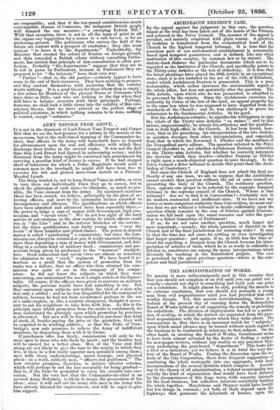ARMY REFORM FROM ABOVE.
IT is not in the dismissal of Lord Ernest Vane Tempest and Cornet Birt that we see the best promise for a reform in the morals of the mess-room, but in the well-timed warning of the Commander-in- chief, that officers in the Army will henceforth have to depend for advancement urn the zeal and efficiency with which they discharge their duties in the several ranks. It was not the first time that Lord Ernest had figured in unbecoming scenes ; and his dismissal from the Army might be construed into punishment for carrying a peculiar kind of licence to excess. If he had stopped short of behaviour for which a Police Magistrate would. send a common man to the treadmill, he might still have been free to exercise his wit and protect mess-room morals as a Provost- Marshal Lynch. The thing wanted is, not to keep Ernest Vanes in order, or even to turn them out individually when they go to excess, but to check the admission of such men—to eliminate, as much as pos- sible, the Vane element from the Army. Its continued existence there has been caused, we believe, principally by the plan of se- lecting officers, and next by the systematic licence accorded to incompetence and idleness. The qualifications on which officers have been admitted and advanced have been especially three,— the power to lodge a sum of money with Government, high con- nexions, and " savoir vivre." We do not lose sight of the hard service at out-stations, or the slow routine by which officers could rise in "the Line" and in the inferior branches of the service ; but the three qualifications sent lucky young men " over the heads" of those humbler and pitied classes. The power to deposit money is called " purchasing " a commission : but since the com- mission can always be returned at par, it really amounts to nothing more than depositing a sum of money with Government, and dab- bling in a certain kind of military stock ; commissions and pro- motions being given by preference to the " warmest" stockjob- bers. Good connexions and savoir vivre are almost as necessary for admission to any " crack" regiment. We have heard it re- marked, as a proof that the system of promotion from the ranks was a failure, that an officer who thus attained his com- mission was quite at sea in the company of his compa- nions : he did not know the subjects on which they were conversing, nor understand the use of a isingle article at the dinner- table. Of course, if the officers were given to converse on military subjects, the parvenu would have had something to say. But they conversed upon subjects not within the view of a man who was only a soldier ; and so he was disqualified for the command of soldiers, because he had not been accustomed perhaps to the use of a table-napkin, or, like a country clergyman thought it neces- sary to ask his neighbour to take wine with him. As this is the principle upon which promotion from the ranks is condemned, we may understand the principle upon which promotion by purchase is advocated. But men will be less inclined to purchase that kind of stock, if, besides paying the price at the quotation, they will be expected to be working soldiers ; so that the Duke of Cam- bridge's new rule promises to relieve the Army of indifferent members, by disgusting them with it in limine.
If purchasers offer less freely, commissions will only be the more open to those who win them by merit; and the broader way will be opened for a better class. Men of the Vane and Birt stamp are not likely to give the tone to the society in which they live, if there be a few really superior men sprinkled among them ; men with sharp understandings, moral courage, and physical pluck—in a word, soldierly men, " officers and gentlemen." The new circular promises, therefore, to initiate ulterior reforms, which will perhaps be not the less acceptable for being gradual— that is, if the Duke be permitted to carry his circular into exe- cution. But the very fact that the Commander-in-chief is an avowed Army Reformer, is likely to insure the prosecution of his ideas ; since it will call out the many able men in the Army who have already thirsted for improvement, and will be eager to give him support.


























 Previous page
Previous page